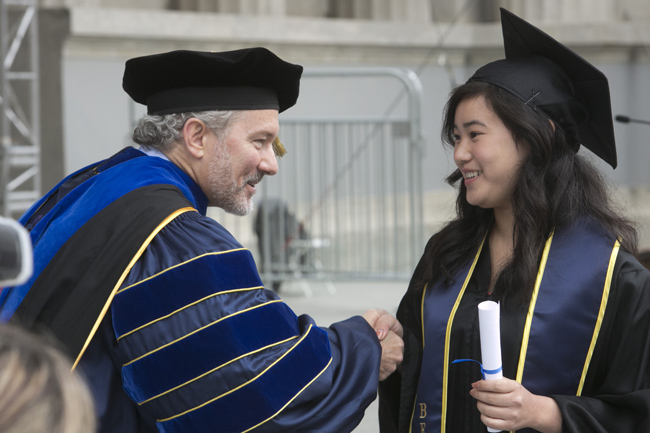
Berkeley Haas Dean, Richard Lyons congratulates a graduate at this year’s commencement. Photo by Jim Block
How they have to produce a deliverable and the degree in which they do so in such a polished and professional manner is amazing and many of the companies provide senior level executives [who] serve as judges and they’re always amazed and say, ‘Wow, are you undergraduate students or MBA students?’ They couldn’t tell the difference. And we think that is such a fantastic way, you know, when students are interviewing with employers, they’re able to draw on specific learnings that happened. And that’s part of their experiential learning. We think that’s a value as well. So again, trying to think about how we can complement with what they’re learning in the classroom more intentionally with things they might do outside of the classroom.
We’re also looking at more joint partnerships across the campus. As a business school, people probably wouldn’t think that business schools would partner very closely with the college of letters and science, but we’ve been doing that a lot more. A lot of business courses draw upon a lot of their theories and concepts based in liberal arts. As we’re teaching and framing business models around some of those concepts, there are synergies we’re finding along the way. We’ve got some ideas that we’re exploring where we are looking at minors, joint-minors across programs and across colleges and schools. One of the areas we’re thinking about is in design and innovation, for example, which might be a joint effort through the business school, mechanical engineering, and the environmental design school. So, if we come together and basically share content and curriculum, and even develop new courses, again that’s kind of that comprehensive, integrated approach that I think is really where we’re going. I think that’s the future of education in general. Really pushing forward a multidisciplinary lens within the context of business and a business leader. So we’ll start to see that.
Not only are we starting to see these synergies more on campus, we’re also beginning to see them outside of campus where peer schools are beginning to also work more jointly. And I’m not talking about the satellite campuses and things like that where you’re partnering with other schools, but working together to actually develop content that we can learn from and share across different campuses. Currently, we’re working with [business schools at the] University of Michigan and the University of Wisconsin-Madison to think about how we prepare our students for a better understanding of leadership and their professional identity. How does their professional identity connect to their personal identity and so we’re just beginning to explore this topic and think about how we can bring more of, again, a liberal arts integrated approach into student learning about self-awareness and leadership and how their impact can be meaningful.
So there’s a lot of things out there where we’re beginning to explore and delve into. That’s very exciting for students who, it’s just not lockstep anymore. It’s not take these courses anymore. You’re not just taking accounting. You’re taking accounting but you’re thinking about how it impacts various markets and various customer bases or how it may impact your organization. And it’s not just about looking at numbers now. It’s about taking a step back and recognizing big picture in different ways. I think that’s very exciting.
P&Q: Business traditionally seems to have been out on its own, generally speaking, why the push towards liberal arts?
Walker: I think it’s been a misconception and a strong perception that’s existed when I was an undergrad. I experienced it. You just see business as kind of it’s own entity cause it’s about revenue generation, it’s about bottom line, or at least that’s what we think. [People see it as different] versus liberal arts or humanities, which is more about learning about ourselves and self-discovery and how we relate to the world.
Well, business is also very similar to that. We’re a business school, our undergraduate program is within a larger university, where it’s all still about the value of a liberal arts education. It’s been very difficult to separate MBA curriculum, for example — or the perception of what MBAs are here and focused to do — from undergraduate education and what undergraduate students are here and should be focused on doing. So there’s been a lot of discussion in the past about whether or not an undergraduate business education is important. Should students major in business when they could apply for an MBA later on? And, what’s the point? What I would say is many people don’t realize that undergraduate education is very much infused and based around liberal arts.
I think that’s the surprise, when we start talking about liberal arts, folks are like, ‘oh is this new?’ It’s actually not new. Many of the programs have been doing this. And again, like I said, traditional methods its been, ‘OK, now we want you to also take courses outside of the business school and then figure out how to make those connections.’ So perhaps you’re taking a course in marketing, and you’re evaluating your customer base and consumer behavior, and then you also take a course in psychology or urban studies and you start to learn how to make connections through that. Well now we’re being more intentional about drawing those connections together in one class instead of saying, ‘take all of these different classes.’ We still want students to do that. We also want to offer more of a robust curriculum that allows them to truly immerse their minds and thoughts around those particular concepts. That’s the difference. It seems like a new thing, but it really isn’t. What we’re doing is further enhancing the idea behind liberal arts integrated business education.











Questions about this article? Email us or leave a comment below.